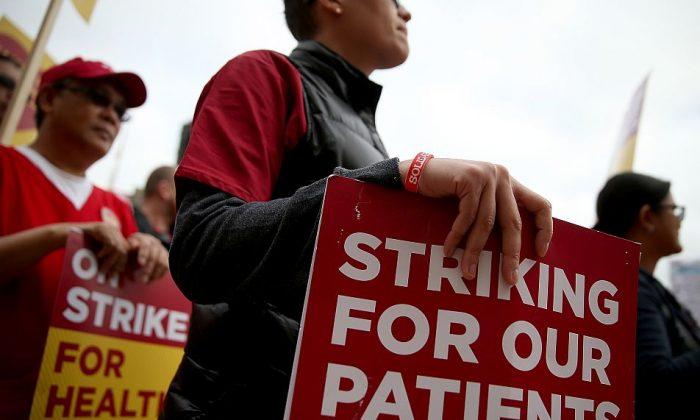WASHINGTON—The cost of keeping or terminating healthcare coverage in employee benefit packages has turned into a major issue for U.S. companies and their benefit managers.
In the recently passed healthcare bill, the 2014 loss of the tax deduction that firms may take due to a subsidy for drug purchases by retirees insured under the Medicare program has firms up in arms.
Towers Watson, a consulting firm, suggests that the loss of the tax subsidy would result in additional costs of $665 for each retiree and $14 billion for all companies combined, according to a Workforce Management report.
This added cost could force some employers to drop healthcare benefits altogether and accept the penalty that comes along with it. But experts recommend that employers not make a rush decision before carefully weighing all cost factors.
“We are counseling against any knee-jerk reactions,” Workforce Management quoted Marcia Benshoof, president of IMA of Colorado, a Denver unit of IMA Financial Group Inc.
Financially, terminating health benefits would be a no-win situation for employers and employees alike and could prove to be more costly in the long run.
“The hidden costs of dropping their health care plans could far outweigh the fine that employers would face for not offering health care coverage,” according to Workforce.
By dumping healthcare coverage, an employer would have to increase salary or lose employees, as workers would have to pay premiums out-of-pocket after tax deductions. Employees would have to pay more, as they no longer would receive the subsidized health package, thereby decreasing disposable income.
Workers who earn above a certain limit are not eligible for the government-subsidized healthcare plan. As such, employers need to increase the employee’s salary equal to an after tax amount, as the employer subsidy is a pretax amount.
For the employer, FICA taxes (Federal Insurance Contributions Act tax) would take a hike. FICA is paid by both the employer and the employee to fund Social Security and Medicare.
Firms without a healthcare package and whose employees will have to rely on the federal subsidy to purchase their health insurance will face a penalty of $2,000 per worker per year, experts say. This rule does not apply to the first 30 employees who apply for the subsidy and does not come into effect until 2014.
Experts suggest that the bill won’t have that great of an impact on employers but addresses shortcomings in the health insurance industry.
“The biggest changes [to the legislation] are provisions affecting the individual market, which doesn’t affect employers at all,” the Workforce article quoted Helen Darling, president of the National Business Group on Health.
Employers’ Decision Quite Clear
“No one’s going to make a big move to drop benefits unless they see an industry leader, a big company, make a move,” Workforce quoted Larry Boress, president and CEO of the Midwest Business Group On Health.
More than half of the 3,700 employers surveyed by Workforce are appalled at the suggestion that they should drop healthcare for their employees and that they would rather pay a fine. Another 15 percent said that dropping the health insurance and paying a fine would be too drastic a reaction. Less that 15 percent are ready to abandon their health insurance for employees.
Executives of almost two-thirds of large firms with more than 25,000 employees think that ditching health insurance is a bad idea, while less than 10 percent wanted to get rid of their health benefits as soon as possible.
“The reaction to the health care reform legislation is, ‘What do I have to do now? Does this impact my employee population and my benefit programs?’... People are grasping for information that will apply to them, and they’re really focused on what they need to do next,” Boress said.
Dropping healthcare benefits has indirect ramifications on hiring and keeping on board qualified and experienced people, roughly two-thirds of the company executives said.
Boress suggests that without clear guidance by the government, it would be difficult to put into practice what has been legislated.
“None of this will function without regulation. Building a law is like saying, ‘We’re going to build a bridge from Chicago to Michigan City, Indiana.’ The law just says you’re going to build the bridge. The regulation tells you what materials to use, when to build, and so on,” Boress explained.
Hurts Jobs?
The new healthcare reform is a “Job killer, costing over 1 million small business jobs alone,” according to a post on the National Federation of Independent Business website forum.
The healthcare bill will affect how a company hires and keeps employees, suggest professors in a recent article by Knowledge@Wharton (KW).
The employee pool will change significantly in any size company. Instead of full-time employees, more companies will hire part-time and temporary workers or independent contractors.
The professors are unclear on the details and implementation of the bill and are unconvinced that the mechanics of cost containment inherent in the bill will work. But they agree that the bill will affect business and how the companies will react.
“Nobody knows how that’s going to work ... The only thing we know is that they’re going to put $5 billion into it. What the coverage will be and what the subsidy will be is up in the air,” said Mark Pauly, professor at Wharton Business School.
In the recently passed healthcare bill, the 2014 loss of the tax deduction that firms may take due to a subsidy for drug purchases by retirees insured under the Medicare program has firms up in arms.
Towers Watson, a consulting firm, suggests that the loss of the tax subsidy would result in additional costs of $665 for each retiree and $14 billion for all companies combined, according to a Workforce Management report.
This added cost could force some employers to drop healthcare benefits altogether and accept the penalty that comes along with it. But experts recommend that employers not make a rush decision before carefully weighing all cost factors.
“We are counseling against any knee-jerk reactions,” Workforce Management quoted Marcia Benshoof, president of IMA of Colorado, a Denver unit of IMA Financial Group Inc.
Financially, terminating health benefits would be a no-win situation for employers and employees alike and could prove to be more costly in the long run.
“The hidden costs of dropping their health care plans could far outweigh the fine that employers would face for not offering health care coverage,” according to Workforce.
By dumping healthcare coverage, an employer would have to increase salary or lose employees, as workers would have to pay premiums out-of-pocket after tax deductions. Employees would have to pay more, as they no longer would receive the subsidized health package, thereby decreasing disposable income.
Workers who earn above a certain limit are not eligible for the government-subsidized healthcare plan. As such, employers need to increase the employee’s salary equal to an after tax amount, as the employer subsidy is a pretax amount.
For the employer, FICA taxes (Federal Insurance Contributions Act tax) would take a hike. FICA is paid by both the employer and the employee to fund Social Security and Medicare.
Firms without a healthcare package and whose employees will have to rely on the federal subsidy to purchase their health insurance will face a penalty of $2,000 per worker per year, experts say. This rule does not apply to the first 30 employees who apply for the subsidy and does not come into effect until 2014.
Experts suggest that the bill won’t have that great of an impact on employers but addresses shortcomings in the health insurance industry.
“The biggest changes [to the legislation] are provisions affecting the individual market, which doesn’t affect employers at all,” the Workforce article quoted Helen Darling, president of the National Business Group on Health.
Employers’ Decision Quite Clear
“No one’s going to make a big move to drop benefits unless they see an industry leader, a big company, make a move,” Workforce quoted Larry Boress, president and CEO of the Midwest Business Group On Health.
More than half of the 3,700 employers surveyed by Workforce are appalled at the suggestion that they should drop healthcare for their employees and that they would rather pay a fine. Another 15 percent said that dropping the health insurance and paying a fine would be too drastic a reaction. Less that 15 percent are ready to abandon their health insurance for employees.
Executives of almost two-thirds of large firms with more than 25,000 employees think that ditching health insurance is a bad idea, while less than 10 percent wanted to get rid of their health benefits as soon as possible.
“The reaction to the health care reform legislation is, ‘What do I have to do now? Does this impact my employee population and my benefit programs?’... People are grasping for information that will apply to them, and they’re really focused on what they need to do next,” Boress said.
Dropping healthcare benefits has indirect ramifications on hiring and keeping on board qualified and experienced people, roughly two-thirds of the company executives said.
Boress suggests that without clear guidance by the government, it would be difficult to put into practice what has been legislated.
“None of this will function without regulation. Building a law is like saying, ‘We’re going to build a bridge from Chicago to Michigan City, Indiana.’ The law just says you’re going to build the bridge. The regulation tells you what materials to use, when to build, and so on,” Boress explained.
Hurts Jobs?
The new healthcare reform is a “Job killer, costing over 1 million small business jobs alone,” according to a post on the National Federation of Independent Business website forum.
The healthcare bill will affect how a company hires and keeps employees, suggest professors in a recent article by Knowledge@Wharton (KW).
The employee pool will change significantly in any size company. Instead of full-time employees, more companies will hire part-time and temporary workers or independent contractors.
The professors are unclear on the details and implementation of the bill and are unconvinced that the mechanics of cost containment inherent in the bill will work. But they agree that the bill will affect business and how the companies will react.
“Nobody knows how that’s going to work ... The only thing we know is that they’re going to put $5 billion into it. What the coverage will be and what the subsidy will be is up in the air,” said Mark Pauly, professor at Wharton Business School.




Friends Read Free